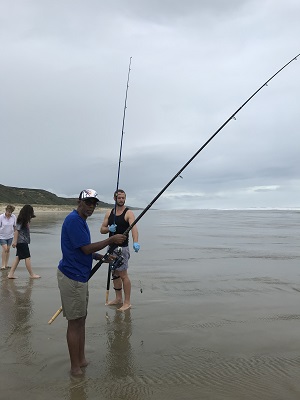 One of the nice things about being here in New Zealand is that we don’t have a language barrier. English is the spoken and written language, which has made communication easier. Yet, while communication has been relatively easy, we have had some challenges with communicating – because context determines meaning.
One of the nice things about being here in New Zealand is that we don’t have a language barrier. English is the spoken and written language, which has made communication easier. Yet, while communication has been relatively easy, we have had some challenges with communicating – because context determines meaning.
When we arrived, one of the members of the congregation asked if we liked fishing. Well, of course we like fishing; it’s something our family enjoys doing together. So, he offered to take us ocean fishing. We were excited for this opportunity since our family has never been ocean fishing.
When the day came, we were told to make up some sandwiches, meet at the member’s house and we would go from there. From our limited wardrobe, we dressed as best we could in clothing appropriate for fishing, packed some sandwiches, grabbed a towel just in case, and put on our water shoes since we expected our feet might get wet with water splashing into the boat.
We arrived at their home where 13’foot fishing poles were being assembled, rigged and tested to ensure we had working gear. As rods and reels were assembled, we were asked if we brought towels and swim wear. We then realized that this ocean fishing expedition may be a bit different from what we were expecting.
We thought going ocean fishing would mean grabbing a fishing pole and some bait, getting in a boat, heading out onto the ocean and fishing. Besides, the rain was pouring down, so I was hoping for some cover in the boat. That was our assumption, and we never asked for clarification. After all, how else will you get to where the fish are in the ocean if not on a boat?
Well, turns out you can! We got into two 4×4 pickups and headed out toward the ocean with no boat in tow. We were going to experience ocean fishing, which is called surfcasting, for the first time not from a boat or a jetty but from the shore. Let me tell you, at least from my perspective, I will not be surfcasting anytime soon. However, my wife is keen to go again.
First, we assembled and baited the 13-foot poles; mind you, we are used to casting 6-foot poles in the lakes and rivers of Idaho. Then, from where we parked on the beach, we walked nearly a quarter of a mile into the ocean at low tide. Casting a 13-foot pole is not as easy as it might seem – especially for beginners! After casting, you release the line and make your way (run!) back toward the shore before a wave knocks you over. Needless to say, in the two casts I made, I was not very successful in avoiding the waves.
Before long we were wet to the waist, because every once in a while, a wave would catch us unaware. The two fish we caught – the only fish we caught – were about 6 inches long.
But we did learn a lesson! Words have limited meaning in and of themselves. Context is what gives precise meaning to words. Think of the many ways in which you use certain words, but then hear others using the same words to mean something else in a different context. (Example from New Zealand: “His eyesight is not too flash.” Meaning: “His eyesight is not too good.”)
We sometimes get ourselves in difficulty because we assume we know what others mean; after all, they are using words we understand. The problem is, we attach certain meanings to the words, but in a different culture and/or context, the same word might have a very different meaning!
Sometimes, rather than assuming we know what is meant, the wisest thing we can do is ask for clarification. This is true in marriage and family relationships (Do you speak the same language as your spouse or your teenager?), as well as in leadership. For example, what do you think of when people say, “We want to grow as an organization,” may be very different from what they mean. Take the time to ask, “What would growth look like for this organization?” You might learn something!
I know that the next time we receive an offer to go fishing (and I hope there is a next time), we will ask a few clarifying questions – because context determines meaning!
If you would like help in achieving your goals as a leader or in any area of your life, call us at 208-880-0307 or email us at errol@errolcarrim.com to schedule a complimentary coaching session. To read Errol’s other posts, visit Christ-Centered Life Coaching.
